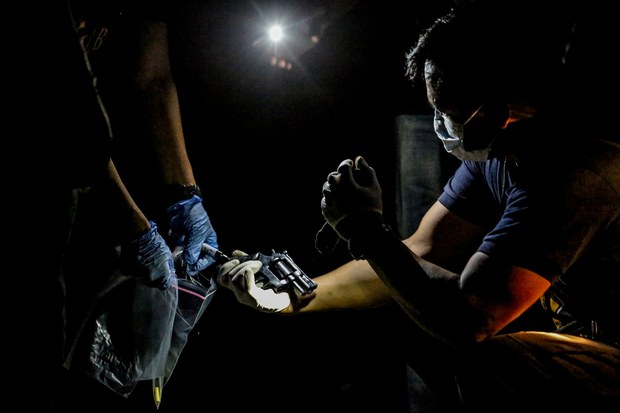UN Rights Experts Call for Independent Probe of Deaths in Philippine Drug War
2019.06.07
Manila
 Police check a handgun recovered from an unidentified drug suspect who was killed in a sting operation in Tondo district, Manila, June 8, 2018.
Police check a handgun recovered from an unidentified drug suspect who was killed in a sting operation in Tondo district, Manila, June 8, 2018.
United Nations human rights experts called Friday for an independent investigation into alleged abuses and killings tied to Philippine President Rodrigo Duterte’s drug war, which has left thousands of people dead since 2016.
The independent experts urged the U.N. Human Rights Council to investigate, saying there was a sharp deterioration in the climate around rights in the Philippines, where defenders were under “sustained attacks.”
“We have recorded a staggering number of unlawful deaths and police killings in the context of the so-called war on drugs, as well as killings of human rights defenders,” the group of 11 special rapporteurs and independent experts said in a statement issued from Geneva.
“It is time for the Human Rights Council to take action against these sustained attacks on human rights defenders and independent watchdog institutions,” they said.
The members include Agnes Callamard, the U.N. special rapporteur on extrajudicial, summary or arbitrary executions, and Victoria Tauli-Corpuz, special rapporteur on the rights of indigenous people.
In February 2018, Philippine officials told Callamard that she should not be involved in a U.N. probe into the drug killings, saying she had prejudged the situation. Later that year, Tauli-Corpuz saw her name included on and later removed from a Philippine government terrorist watch list.
In Friday’s statement, the group said members were concerned about the number of killings across the Philippines, and they pointed to an “apparent climate of official, institutional impunity.”
“Very few independent and effective investigations have taken place, independent media and journalists are threatened, the law has been weaponized to undermine press freedom, and the independence of the judiciary is undermined,” they said.
Since Duterte became president in mid-2016, an estimated 5,300 suspected addicts and drug dealers have been killed in actual sting operations that turned violent, according to official figures compiled by police. Rights advocacy groups, however, have placed the figure at between 20,000 and 30,000, including many deaths blamed as unsolved killings by pro-government vigilantes.
In many of the cases, the perpetrators were members of the military, police or groups associated with them, the U.N. experts said.
Those who dare to question the government about it, including members of the press and rights groups, are subjected to attacks, the group alleged.
“In the past three years, we have repeatedly brought to the attention of the government cases alleging a range of gross human rights violations, such as extrajudicial, summary or arbitrary executions, including of children, persons with disabilities, indigenous peoples, trade union and land right activists,” the U.N. officials said.
“Those cases also included allegations of arbitrary detention, torture or inhuman or degrading treatment, gender-based violence against women human rights defenders, attacks against the independence of judges and lawyers, freedoms of expression and of assembly, as well as people’s right to food and health. Sadly these cases are just the tip of the iceberg with many more cases being reported regularly,” they added.
In Manila, a spokesman for President Duterte did not respond to repeated requests from BenarNews on Friday for comment.
Earlier this year, Duterte pulled the country out of a treaty that created the International Criminal Court, and he warned ICC prosecutor Fatou Bensouda of arrest if she stepped on Philippine soil. There are two cases filed against Duterte at the ICC – one by self-confessed members of an alleged death squad that operated when he was a mayor in the southern city of Davao, and another by families of the victims of his drug war.
Duterte has said the drug war would continue until his term ends in 2022.
Failure to prosecute
The U.N. group challenged the government for failing to prosecute and investigate those responsible for the attacks and accused Duterte of trying to evade accountability. The move to disengage from the ICC “is the last of many actions demonstrating that the government is seeking to evade scrutiny and reject accountability,” the rights experts said.
“The government has shown no indication that they will step up to fulfill their obligation to conduct prompt and full investigations into these cases, and to hold perpetrators accountable in order to do justice for victims and to prevent reoccurrence of violations. There are now thousands of grieving families in the Philippines,” the group said.
Carlos Conde, the Philippine researcher for the New York-based Human Rights Watch, said Duterte’s drug war likely would continue as long as there was no accountability.
“The Duterte administration is determined to pursue the drug war because it serves a political purpose for Duterte, regardless of the fact that it is not working to eliminate illegal drugs in the country,” Conde told BenarNews.
He said HRW had been calling for an investigation.
“The situation in the Philippines remains dire – the killings continue on a daily basis, with practically zero accountability,” Conde said, adding that Duterte’s increased political power had allowed the president to “frustrate attempts to bring him to justice.”
Meanwhile, Sen. Francis Pangilinan, an opposition leader, told BenarNews that he hoped the renewed international attention on the drug war would “help slow down the swaggering impunity among those who have abused their power with these killings.”







